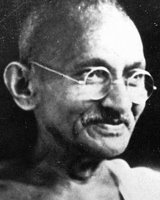Ever since yesterday's speech by President Bush on secret prisons and torture I have been waiting eagerly for a response from a teacher and friend of mine,
Ray McGovern. Ray is a sincere Christian and a former CIA analyst. Ray's voice is one that America needs to be listening to, please read his strong words below.
The Torturer's ApprenticeBy Ray McGovernTomPaine.com
Ray McGovern works with Tell the Word, the publishing arm of the ecumenical Church of the Saviour. He was an Army infantry/intelligence officer, then a CIA analyst for 27 years, and is now on the Steering Group of Veteran Intelligence Professionals for Sanity.Addressing the use of torture Wednesday, President George W. Bush played to the baser instincts of Americans as he strained to turn his violation of national and international law into Exhibit A on how “tough” he is on terrorists. His tour de force brought to mind the charge the Athenians leveled at Socrates—making the worse case appear the better. Bush’s remarks made it abundantly clear, though, that he is not about to take the hemlock.
As the fifth anniversary of 9/11 approaches and with the midterm elections just two months away, the president's speechwriters succeeded in making a silk purse out of the sow’s ear of torture. The artful offensive will succeed if—but only if—the mainstream media is as cowed, and the American people as dumb, as the president thinks they are. Arguably a war criminal under international law and a capital-crime felon under U.S. criminal law, Bush’s legal jeopardy is even clearer than when he went AWOL during the Vietnam War. And this time, his father will not be able to fix it.
Bush in jeopardy? Yes. The issue is torture, which George W. Bush authorized in a
Feb. 7, 2002, memorandum in contravention both of the Geneva Accords and 18 U.S. Code 2441, the War Crimes Act that incorporates the Geneva provisions into the federal criminal code which was approved by a Republican-led Congress in 1996. Heeding the advice of Vice President Dick Cheney’s counsel, David Addington, then-White House counsel Alberto Gonzales and Assistant Attorney General Jay Bybee, the president officially opened the door to torture in that memorandum. His remarks yesterday reflect the determination of Cheney and Bush to keep that door open and accuse those who would close it of being "soft on terrorists."
The administration released that damning memorandum in the spring of 2004 after the photos of torture at Abu Graib were published. It provided the basis for talking points that the president wanted “humane” treatment for captured al-Qaida and Taliban individuals. And—surprise, surprise— mainstream journalists like those of The New York Times swallowed the bait, clinging safely to the talking points and missing altogether Bush’s remarkable claim that “military necessity” trumps humane treatment. That assertion, over the president’s signature, provided the gaping loophole through which Defense Secretary Donald Rumsfeld and then-CIA Director George Tenet drove the Mack truck of officially sanctioned torture.
Using the arguments adduced by the Addington/Gonzales/Bybee team, Bush’s 2002 memo made the point that the bedrock provision of Geneva—common Article 3—does not apply to al-Qaida or Taliban detainees, but that the U.S. would “continue to treat detainees humanely and, to the extent appropriate and consistent with military necessity , in a manner consistent with the principles of Geneva.” (Emphasis added.)
Sounding very much like Mafia lawyers, the president’s legal troika felt it necessary to warn him that playing fast and loose with the U.S. War Crimes Act (Section 2441) could conceivably come back to haunt him. The bizarre passage that follows is the best they could offer in terms of reassurance:
It is difficult to predict the motives of prosecutors and independent counsels who may in the future decide to pursue unwarranted charges based on Section 2441. Your determination would create a reasonable basis in law that Section 2441 does not apply, which would provide a solid defense to any future prosecution.
While the imaginative lawyering of Addington (now Cheney’s chief of staff), Gonzales (now Attorney General), and Bybee (now a federal judge) may have qualified for a presidential “heck-of-a-job” at the time, Bush is learning the hard way that, while sycophants are fun to have around, they can do a president in. Between the lines of Bush’s rhetoric yesterday lies belated acknowledgement that his decision to condone the torture of al-Qaida and Taliban captives is now back to haunt him—big time.
The Supreme Court decision on Hamdam v. Rumsfeld , announced on June 29, 2006, stripped the president of the magic suit of clothes approved by his courtiers when it found the “military tribunals” invented by the Cheney-Rumsfeld cabal to try terrorists illegal. The Court rejected the artifice of “unitary executive power” used by the Bush administration to “justify” practices like torture, indefinite detention without judicial process, and warrantless eavesdropping. In other words, the Supreme Court of the United States reaffirmed that ours should be a government of laws, not of the caprice of the vice president or president. And in condoning torture, they are outlaws.
The Defense Rests Not
The president’s performance yesterday reflects the time-honored adage that the best defense is an aggressive offense—and especially with a mere two months before the midterm elections. Bush devoted fully half of his speech to cops-and-robbers examples, none of them persuasive, of how “tough” interrogation techniques have yielded information that prevented all manner of catastrophe. Someone in the White House apparently forgot to tell the Army, for the head of Army intelligence, Lt. Gen. John Kimmons, sang from a very different script at a Pentagon briefing yesterday, as he explained why the new Army manual for interrogation is in sync with Geneva. Conceding past “transgressions and mistakes,” Kimmons said:
No good intelligence is going to come from abusive practices. I think history tells us that. I think the empirical evidence of the last five years, hard years, tells us that.
Grabbing the headlines today is the fact that
Bush has admitted that the CIA has taken high-value captives to prisons abroad for interrogation using “tough” techniques. More telling is the fact that CIA interrogators are not bound by the strictures of the new Army field manual, and that the president is determined to maintain in place detention centers where CIA interrogators can ply their trade at his bequest.
The president brags about how his government “changed its policies,” giving intelligence personnel “the tools they need” to fight terrorists, and makes it clear that the CIA was given permission to use “an alternative set of procedures.” He said he could not describe the specific methods used, “but I can say the procedures were tough.” The alumni of this school of hard knocks are now on their way to Guantanamo, but Bush made it clear that he wanted to keep the schools open for incoming students.
Acknowledging that other terrorists are waiting in line to take the place of captured leaders, the president made it clear that he wants the “CIA program” for interrogating advanced placement terrorists to continue. Bush conceded that, after the Hamdan decision, “some believe” that intelligence personnel “could now be at risk of prosecution under the War Crimes Act—simply for doing their jobs in a thorough and professional way.” So he is asking Congress to pass legislation squaring the circle; that even while using “alternative” procedures, CIA personnel can be said to be in compliance with common Article 3 of Geneva. (The not-so-hidden threat, of course, is the virtual certainty that any member of Congress opposing this kind of legerdemain will be branded soft on terrorism in the weeks leading up to the November election.)
In a bizarre twist, the retroactive nature of this legislation, which the president said “ought to be the top priority” over the next several weeks, would hold Bush himself harmless, at least under the U.S. criminal statute, as well as intelligence practitioners of “alternative” procedures.
And so the stage is set. There is one more Bush speech to go on this general theme. It’s a safe bet that the next one will present an equally impassioned defense of warrantless eavesdropping on Americans, branded unconstitutional and illegal by Judge Anna Diggs Taylor in Detroit because it violates the Fourth Amendment and the Foreign Intelligence Surveillance Act. Sen. Arlen Specter, R- Pa., who initially called that activity extralegal, has now come full circle and drafted legislation that would hold harmless the president and others involved in that program—and, again, retroactively. It is hard to tell what brought Specter 180 degrees around; not to be ruled out is the kind of “alternative procedure” employed so successfully by former FBI director J. Edgar Hoover, who was the inadvertent catalyst for the FISA law.
Accountability
Is there no one to hold our leaders to account? The Bush Crimes Commission, a grassroots citizens’ initiative determined not to follow the example of the obedient, passive Germans of the 1930s, has taken testimony on torture and other key issues to establish whether President Bush is guilty of war crimes. Testimony was taken in October 2005 and January 2006, indictments have been brought and served on the White House, and the judges will issue their verdict on
Sept. 13 in Washington. (Full disclosure: I am proud to have taken part in the proceedings of the Bush Crimes Commission.) Join us next week.
The above article was first published at:
http://www.tompaine.comPlease share Ray McGovern's voice with others.


















